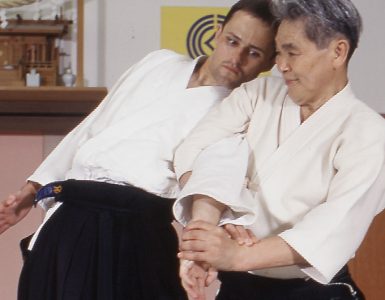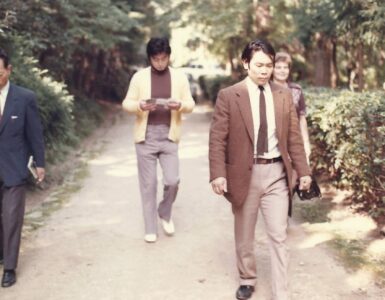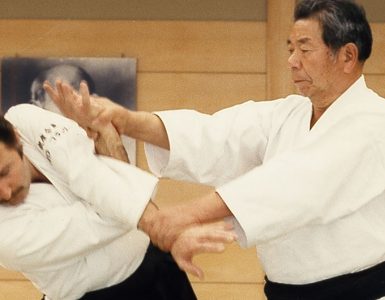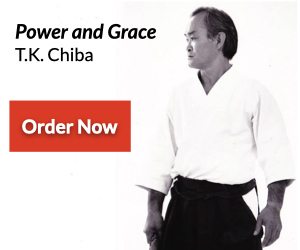The following translation from the Japanese-language autobiography entitled Aikido Jinsei (An Aikido Life) by Gozo Shioda Sensei of Yoshinkan Aikido is published with the kind permission of the author and the publisher, Takeuchi Shoten Shinsha. The series began with AIKI NEWS No. 72. Read the thirteenth part here.
Gozo Shioda travels through tropical paradises on his way to Pontianak in Borneo. He tells of shopping sprees and unusual encounters with a new culture. But his comforts and pleasures are assured when he begins to teach aikido to two government officers.
A Wealth Of Goods In Indonesia
We all stayed together at the Hotel Yamato [in Makassar (now known as Ujung Pandang) on Celebes Island]. Manners, scenery, lifestyle, everything we saw and heard on this tropical island were so curious that Kagawa and I went to town to go sightseeing with the help of the rusty Indonesian we had hastily learned during our voyage. In those days in Japan the controlled distribution of cotton products caused shortages and high prices, and people could hardly afford to buy such goods. But in Indonesia there were piles of goods, from dress shirts and open-necked shirts to leather shoes, clothing to be envied at home in Japan. There were also pieces made from tortoise shell which were abundant and incredibly cheap. I had plenty of money and bought whatever I came across that looked novel. Since the trip was to be treated as a business trip until we reached Borneo, we had no concern about our budget and went around buying whatever we wanted. For example, a belt made from tortoise shell was available for only one yen and fifty sen in Japanese money. By nature I love animals, and since monkeys could be bought for fifty sen, I bought as many as five. Two dozen handkerchiefs cost about one yen. Kagawa saw my frivolous purchases and said, “Shioda, we will be stopping by Surabaya in Java. We’d better save our money. I hear they have far more goods than here.” I followed his advice to restrain my purchases, but instead we looked for cabarets and bars in order to cheer our spirits since we were feeling down about being away from Japan.
After staying for seven days, on November 23 we boarded a small 2500-ton ship, the Tsutamaru, bound for Java. As soon as we arrived safe in Surabaya, Java, early in the morning of November 27, we went to a hotel to rest. It was then that we got the news that, fortunately or unfortunately, our ship, the Tsutamaru had been suddenly commandeered by the Navy and that no one knew when it would return. We felt ambivalent about this turn of events, and no one could decide if the delay was to our advantage or not. We were irritated that it would take extra time to arrive at our destination, but on the other hand we could enjoy extra holidays in Surabaya. After spending too much money on pleasure in Borneo, everyone was a little worried about their budget, and since we didn’t know when a Japanese ferryboat would arrive we were a bit uneasy. However, things somehow worked out well, by the grace of Heaven. We luckily discovered in Surabaya the Taiwan Chikusan, a company affiliated to the Taiwan Colonization group. It was sending engineers to the channel between Bali and Lombok for development projects. Mr. Tsutomu Fujimoto, the accounting director, was a fellow alumnus of my own university, and so I was able to borrow 50 yen from his company to pay the hotel expenses for our extra stay.
Enjoying Extra Holidays In Surabaya
We stayed in Surabaya for nearly a month with well-filled purses. During this time we gave ourselves over completely to the pleasures of life. We could never enjoy ourselves more than we did on that occasion. Drinking, flirting with hostesses, and money; we wanted nothing else. We felt as if we were walking on air, indulging day in and day out in pleasure in Surabaya. I suppose such blind hedonism resulted in Japan’s defeat in the Second World War. Even employees of trading companies like ourselves behaved this way; imagine how the privileged serviceman were able to indulge themselves. Surabaya in those days was just like paradise, allowing Japanese servicemen to indulge in pleasures and even to forget the war itself. I look back with embarrassment on those days!
There is an amusing episode from this time. In Surabaya they sold pieces of cloth, about the size of a Japanese handkerchief and the texture of a kind of towel. I always carried one around with me to wipe the sweat from my face. I found such cloths handy and carried one with me both on the streets and at home. One day some Indonesian people giggled to see me wiping my face with one of these cloths, and I wondered if there was something on my face, or something strange about me. Later I told one of my close Indonesian friends about this, and he explained that the Dutch, during the time that they ruled in Indonesia, used to use such cloths to clean themselves after having sex, and that seeing me wipe my face made them giggle. Even after I understood the original purpose of the cloth, I still kept carrying and using one regularly. Who would care what part of my body I wiped with it, I thought. Something so convenient should be made good use of. I opposed the blind acceptance of a different culture’s customs and I particularly hated the wholesale adoption of the Western lifestyle. In those days I was too proud and arrogant that Japan had beaten the West to rule their territory, which led to this attitude of mine.
But in Indonesia there were piles of goods, from dress shirts and open-necked shirts to leather shoes, clothing to be envied at home in Japan. There were also pieces made from tortoise shell which were abundant and incredibly cheap. I had plenty of money and bought whatever I came across that looked novel. Since the trip was to be treated as a business trip until we reached Borneo, we had no concern about our budget and went around buying whatever we wanted.
The time came to leave the paradise of Surabaya when the suddenly commandeered Tsutamaru came back after a nearly one month absence. Leaving Surabaya regretfully behind, we set out for the unfamiliar territory of Borneo after the middle of December. The tiny Tsutamaru slowly sailed for Pontianak, Borneo and arrived without incident at Pontianak Harbor on January 1, 1943. Pontianak was a savage land, and looked so simple, even primitive, after the lively city of Surabaya.
Pontianak, Borneo
In Borneo, the waters were muddy and the natives walked around practically naked except for their sarongs. They were friendly and their manners simple.
The closer our ship got to the harbor, the more clearly we could see the figures walking along the quay. I was standing on deck and looking into the harbor for no particular reason like all the other passengers, when I happened to spy one of my college classmates, Nobuo Nishi, who later worked for the government tax office. I could hardly wait to land, and shouted at him a number of times, “Nishi! Nishi!” He noticed my shouts and as soon as the ship got into the harbor, he jumped aboard to see me. I was filled with deep emotion when I unexpectedly ran into an old friend in Borneo, a foreign island so far from Japan. The emotion was beyond description.
He had been working for the Sumitomo Shokusan and during the war he was drafted to work for the Transportation Department of the Naval Civil Administration Bureau. It seems that during the war each private company was required to send one employee to the Naval Civil Administration. Nishi told me that he was the first one drafted from his company, and that he had been in Borneo for a year already. We appreciated having him as a guide in this completely foreign place. He took us to the hotel first and we settled down after our long sail. We needed to start the next day to make inquiries into arranging our own residence. The hotel was too humble to be called a hotel, and was even rougher than the cheapest apartment in Japan. The biggest headache was the great shortage of water. Water for drinking and cooking was stored in big barrels called ton placed under the eaves of the roof to collect rain water. In the dry season, however, we could not expect enough rain, and we were desperate for water. As you know, rainwater contains no lime and drinking it may cause one’s teeth to become susceptible to decay. If you rely on rainwater for daily drinking, you must make sure that you take enough calcium, which is bothersome. But what we were even more concerned about were the infectious diseases like malaria and dengue. Malaria and its symptoms are better known than those of dengue, which include a high fever and a severe, intolerable headache. It was said that once you had caught the dengue virus, you would become immune and would not catch the disease again.
We stayed in Surabaya for nearly a month with well-filled purses. During this time we gave ourselves over completely to the pleasures of life. We could never enjoy ourselves more than we did on that occasion. Drinking, flirting with hostesses, and money; we wanted nothing else. We felt as if we were walking on air, indulging day in and day out in pleasure in Surabaya. I suppose such blind hedonism resulted in Japan’s defeat in the Second World War.
Incidentally, I got dengue only two days after I landed and was very sick. No medication was available, except aspirin prescribed by a doctor. The high doses of aspirin caused me such serious stomach pain that I could not eat anything for a while. It took about a week to recover completely. In the meantime a lot of work had piled up including arranging for our housing which was the most urgent task. All the houses in town were under the control of the Naval Civil Administration and supervised by its director.
As I mentioned before, our new joint corporation consisted of eleven members, eight from the Taiwan Colonization Company and three from Taiwan Tanning.
The president, Mr. Omori was president of both companies. My title was Director of General Affairs and the Accounting Management section for the Taiwan Colonization Company. Kagawa held the same position in Taiwan Tanning. He was a man of firm character, and I liked the side of his character that was impulsive and strong-willed. The Taiwan Colonization Company contributed assets in the amount of 500,000 and Taiwan Tanning contributed 200,000. I was responsible for the Taiwan Colonization Company funds as its accounting management director, and Kagawa was responsible for the Taiwan Tanning funds.
When I had recovered completely from the dengue fever, our president Mr. Omori, Kagawa and I visited Mr. Shigeeda, director of the Naval Civil Administration at his residence on January 10th, 1943. Mr. Shigeeda, who was effective as the first government official sent to Borneo by the Ministry of Home Affairs, was young, almost my age. At first impression he seemed arrogant, which I found intolerable. But as we talked to each other and the rough edge of his character wore away, I started to understand his personality. We went there that time just to pay a courtesy call.
When I went to see Mr. Shigeeda by myself the next day, he welcomed me and introduced me to Mr. Masaki who was the official in charge of maintenance of public law and order in Pontianak. His position might be equivalent to something like the Superintendent General of the Metropolitan Police Department in Japan. He held a fifth dan in judo and had a good physique. When I referred to aikido in passing during our conversation and demonstrated a basic technique on his arm, he was so impressed that he declared he would like to set a time and start learning it the very next day. Mr. Shigeeda also said he would like to join the lesson. Now I had two aikido students in Pontianak. I appreciated the proverb which says that accomplishments are of lifelong benefit to their possessor. After becoming acquainted with these governmental officials, things went well for me; our request for housing in Pontianak was promptly met, and we were provided with as many as three fine houses on the main street. The fact that we got such a prime office and residences on the main street in spite of our late arrival in the city was the best reception we could have and this was all thanks to aikido. My house was very large with seven rooms surrounded by a large yard. I assigned a staff member from Taiwan there. Kagawa lived by himself in the house that was used as an office, and at the other house resided a plant president and Mr. Kikuchi, a Kyoto University graduate engineer. Mr. Kikuchi was to give us some problems which I will describe later in this book. We randomly assigned some employees to these two residential houses. Since they were engineers working out in the mountainous regions, they were rarely in the city.
By corporate rule, each residential house had two manservants and a maid, and each company paid 15 yen per month for them.
My private life in Pontianak was so luxurious as to have thirteen manservants and three maids. As much as ¥30,000 per month was provided as my secret service fund which to a certain extent I could do with as I pleased. The engineering plant president was always busy in the mountains with both the Taiwan Colonization Company’s business collecting gambir, and Taiwan Tanning’s duty of extracting special substances for tanning leather from a plant called the mangrove. The Naval Department ordered our joint corporation to investigate the wild island named Tordipil where mangroves grew densely. Therefore, we immediately bought two motor boats to use when investigating the area; one belonged to the Taiwan Colonization Company and one to Taiwan Tanning. Most of the time Kagawa had Taiwan Tanning’s boat. Although he was supposed to work in the office, he liked machines and was skillful enough at operating motorboats to be able to go on active research expeditions along the river. During the war, we didn’t know whether we could ever see Japan again. We felt strongly determined to do our best as long as we still lived. Rather than submit to desperate or helpless emotions, we shared the pride of youth to challenge our destiny.
On the other hand, however, since I had no knowledge of accounting I didn’t know what to do. I had difficulty in handling complicated accounting work. I asked in vain for advice from Kagawa, who was a graduate of the Business Department of Meiji University. He did not seem to be familiar with the practical skills of accounting either. “Well, just write out the chit,” was his advice.
When I referred to aikido in passing during our conversation and demonstrated a basic technique on his arm, he was so impressed that he declared he would like to set a time and start learning it the very next day. Mr. Shigeeda also said he would like to join the lesson. Now I had two aikido students in Pontianak.
Since the other employees were all engineers and out of the city investigating sites, only Kagawa and I remained to work in the office in the city, and thus we enjoyed more free time to ourselves. Ironically, more than enough time and money is not always beneficial, as the proverb says, “The idle brain is the devil’s playground.” The proverb was certainly true of my life then. When we were at work in the office in the morning, Indonesians and expatriate Chinese merchants would come and sell a variety of goods. I was a youth working in a remote rural area and could not be certain of my future security, or if I would be able to return to Japan again. In my mind, I seemed to live on the battlefield, and my temper may have become rough beyond my control, and I tended to be little devoid of clear reasoning ability. We spent time everyday thinking that we should enjoy ourselves as long as we were alive. Since the price of gold those days was relatively low at 50 sen for 3.75 grams, I ordered the arm of my phonograph machine to be made out of 2,812.5 grams of pure gold with an inlaid diamond in the middle of it. I enjoyed playing records with such a gorgeous phonograph machine. My daily routine consisted of working in the office in the morning, going to Aikido training in the afternoon, and having parties with governmental officials like Mr. Shigeeda, Mr. Masaki, and others as guests at my residence almost every night. Sometimes we killed our youthful boredom by having our servants engage in sumo matches or by watching Indonesian dances.













Add comment